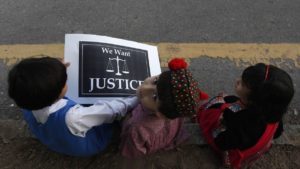By Marria Qibtia Sikandar Nagra
 A little child , barely aged 5 , with his head humbly lowered, eyes fixated on the floor, sweeps, hurriedly working before he is castigated for being slow in his movements. His naivety is just a familiarity with the tasks he is meant to accomplish before the end of the day. He knows nothing more than that. To work and to please his employer is all that he is taught. This is a glimpse of child domestic abuse for you. The horrifying abuse of child domestic workers in Pakistan is a matter mandating immediate consideration.The recent demise of child worker Zohra, who came to be mercilessly kicked and killed by her employers for accidentally freeing their exotic parrots, signals a petrifying reality with respect to the sad vulnerability of child domestic workers in Pakistan. It was not long before that we heard of the innocent Uzma battered to death with a ladle by her employers only because she dared to consume food from her employer’s daughters plate. Always underfed and made to sleep on a cold floor, little Uzma lost her life for one morsel of food! Or how can we forget the young 12 year old boy Taqi Usman whose employer clubbed him to death since he forgot to feed their domestic pet! Such monstrosity subjected to innocent credulous little children yet what we do is remain apathetic and silent in the face of child servitude?
A little child , barely aged 5 , with his head humbly lowered, eyes fixated on the floor, sweeps, hurriedly working before he is castigated for being slow in his movements. His naivety is just a familiarity with the tasks he is meant to accomplish before the end of the day. He knows nothing more than that. To work and to please his employer is all that he is taught. This is a glimpse of child domestic abuse for you. The horrifying abuse of child domestic workers in Pakistan is a matter mandating immediate consideration.The recent demise of child worker Zohra, who came to be mercilessly kicked and killed by her employers for accidentally freeing their exotic parrots, signals a petrifying reality with respect to the sad vulnerability of child domestic workers in Pakistan. It was not long before that we heard of the innocent Uzma battered to death with a ladle by her employers only because she dared to consume food from her employer’s daughters plate. Always underfed and made to sleep on a cold floor, little Uzma lost her life for one morsel of food! Or how can we forget the young 12 year old boy Taqi Usman whose employer clubbed him to death since he forgot to feed their domestic pet! Such monstrosity subjected to innocent credulous little children yet what we do is remain apathetic and silent in the face of child servitude?
 Child domestic servitude is a pervasively grave reality in Pakistan. The practice of hiring children as little workers to assist in managing home chores is a convenient occurrence. These children come to be hired not only because they are young and swift in their movements and hence are believed to accomplish tasks quickly, but also because being young, they can be moulded and rebuked according to the employers will.Their vulnerability is taken advantage of by the employers who push them to do unnecessary hard work, a failure of which results in harsh punishments.Since they come from economically depraved sectors of the society , these little children share the financial burden of their families. At a young age, they are expected to gauge the value of money, an absence of which pronounces their future.
Child domestic servitude is a pervasively grave reality in Pakistan. The practice of hiring children as little workers to assist in managing home chores is a convenient occurrence. These children come to be hired not only because they are young and swift in their movements and hence are believed to accomplish tasks quickly, but also because being young, they can be moulded and rebuked according to the employers will.Their vulnerability is taken advantage of by the employers who push them to do unnecessary hard work, a failure of which results in harsh punishments.Since they come from economically depraved sectors of the society , these little children share the financial burden of their families. At a young age, they are expected to gauge the value of money, an absence of which pronounces their future.
 The Human Rights Commission of Pakistan estimates that about 12 million children constitute Pakistan’s labour force. From amongst this figure, about 264,000 innocent little children are approximated to be employed in domestic settings. Half of these children are sadly below the age of 10. Despite being shunned by the HRCP , Pakistani constitution and the Convention on the Rights of the Child, the normalisation of child work in Pakistan is not only unethical but also signals our collective culpability in failing to put a definite end to this menace. Despite drafting and presenting its very first Bill on domestic workers , the Domestic Workers Act in the year 2013, which ultimately came to be passed by the Senate in 2017, little has been achieved with respect to safeguarding domestic labour rights in Pakistan.The law aimed at bringing domestic workers under the jurisdiction of labour laws in order to protect their rights , to ensure their welfare and to guarantee their social security , directing their employment conditions along with a seamless provision of health facilities. However, the failure in the implementation of the law speaks volumes about the gravity of apathy on part of the government in addressing this grave issue.
The Human Rights Commission of Pakistan estimates that about 12 million children constitute Pakistan’s labour force. From amongst this figure, about 264,000 innocent little children are approximated to be employed in domestic settings. Half of these children are sadly below the age of 10. Despite being shunned by the HRCP , Pakistani constitution and the Convention on the Rights of the Child, the normalisation of child work in Pakistan is not only unethical but also signals our collective culpability in failing to put a definite end to this menace. Despite drafting and presenting its very first Bill on domestic workers , the Domestic Workers Act in the year 2013, which ultimately came to be passed by the Senate in 2017, little has been achieved with respect to safeguarding domestic labour rights in Pakistan.The law aimed at bringing domestic workers under the jurisdiction of labour laws in order to protect their rights , to ensure their welfare and to guarantee their social security , directing their employment conditions along with a seamless provision of health facilities. However, the failure in the implementation of the law speaks volumes about the gravity of apathy on part of the government in addressing this grave issue.
 The trajectory does not simply end here. Even if the domestic labour laws come to be implemented, and child domestic abuse comes to be prohibited, in the absence of viable alternatives and safety nets, the danger of leaving our child workers in a worse off state is quite plausible. From being victims of abuse at their employers homes, they will move onto become victims of their unfortunate circumstances. In the quest for convenient money acquisition they may have a depressing street life ,resort to drug consumption as well as theft and even a consider prostitution, which is much likely in the case of girls. When basic needs are not met , it is human nature to look for the easy way out.In the case of child domestic workers , the easier option is a resort to all these abhorrent and socially regressive acts.
The trajectory does not simply end here. Even if the domestic labour laws come to be implemented, and child domestic abuse comes to be prohibited, in the absence of viable alternatives and safety nets, the danger of leaving our child workers in a worse off state is quite plausible. From being victims of abuse at their employers homes, they will move onto become victims of their unfortunate circumstances. In the quest for convenient money acquisition they may have a depressing street life ,resort to drug consumption as well as theft and even a consider prostitution, which is much likely in the case of girls. When basic needs are not met , it is human nature to look for the easy way out.In the case of child domestic workers , the easier option is a resort to all these abhorrent and socially regressive acts.
 For instance in 1993 when garment employers in Bangladesh fired about 50,000 child workers in fear of their imports being banned by US for engaging child workers for their production, since no alternatives came to be presented to these child workers, many resorted to prostitution and stone crushing.This came to be remedied only when ILO, UNICEF and the Bangladesh Garment Manufacturers and Associations jointly established schools for these children’s rehabilitation , encouraging families to send them for education by offering attractive stipends. For Pakistan, a rectification of its child domestic workers quandary requires an exigent consideration for viable livelihood alternatives to such workers. Only this will constitute an amicable solution to this conundrum.
For instance in 1993 when garment employers in Bangladesh fired about 50,000 child workers in fear of their imports being banned by US for engaging child workers for their production, since no alternatives came to be presented to these child workers, many resorted to prostitution and stone crushing.This came to be remedied only when ILO, UNICEF and the Bangladesh Garment Manufacturers and Associations jointly established schools for these children’s rehabilitation , encouraging families to send them for education by offering attractive stipends. For Pakistan, a rectification of its child domestic workers quandary requires an exigent consideration for viable livelihood alternatives to such workers. Only this will constitute an amicable solution to this conundrum.









